Entretien avec
Pierre Tremblay
Existe aussi en Version Française
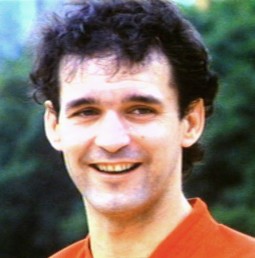
Of all the gweilos who appeared in IFD ninja flicks, Pierre Tremblay occupies a very special place in our eyes. A past master in the fine art of portraying / impersonating Machiavellian bad guys with a mocking grin, this French Canadian has become some sort of an icon of psychotronic cinema. Off-beat movie buffs might remember his face from films where dashing night warriors in cherry red or chick yellow suits fight one another with flying smoke grenades in city parks or public gardens. After obsessively hunting down the man, we managed to learn Pierre was still living in Hong Kong, where he was now working as a local radio station presenter on RTHK. We contacted him in 2006. Intrigued, he accepted the idea of being interviewed and... then nothing. Not a single word. Imagine our surprise when four years later, monsieur Tremblay eventually got in touch with us to deliver his story. Here are the memories of a travelling man who seems to be amused about his past - a text sometimes reflecting the French Canadian accent of this Hong Kong lover. The rich and beautiful life of a happy gweilo!
Interview conducted by Rico in February 2010.
I thank you for your patience, I admit that 4 years is a bit long to answer, but I had my reasons. To paraphrase French singer-songwriter Jacques Higelin: "Life is what happens to you when you're busy trying to do something else." The side of my media career with the least success is the one receiving the most attention, thanks to you. So I answer.
I've decided to answer your thirty-odd questions (!) with a resume of my career, and to delve deeper on certain points of interest along the way.
I left Montreal when I turned 21 to travel around the world, thanks to a small inheritance that nevertheless allowed me to travel 2 1/2 years practically without stop. I got to know my first half of the planet, namely the Americas (North, Central, South), a few Pacific Islands, and I was going up East Asia when I stopped in Hong Kong to make some money and continue travelling.
I started doing odd jobs, mostly teaching French and Spanish. I was also teacher at the 'Alliance Française de Hong Kong' for six months, before being introduced to casting agencies. At first I was able to get a few jobs as extra in TV commercials, then small roles in Cantonese TV series. They were always either "Bad Foreigner" roles (drunken sailors in fights), or "rather naive" roles (like foreign priests in Chinese provinces who get beat up and/or killed within five minutes after showing up on screen).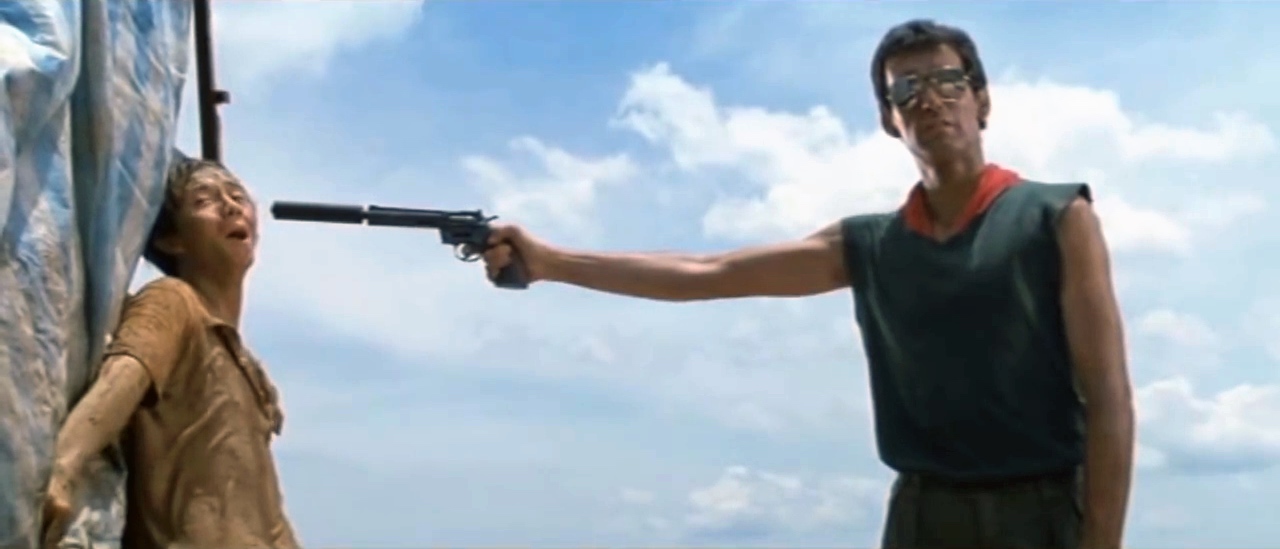 Pierre Tremblay, as grinning as can be in "Dangerous Encounters of the 1st Kind" a.k.a. "Don't Play With Fire" (1980), directed by Tsui Hark.
Pierre Tremblay, as grinning as can be in "Dangerous Encounters of the 1st Kind" a.k.a. "Don't Play With Fire" (1980), directed by Tsui Hark.
I could already speak a little Cantonese as I had just taken an intensive Mandarin trimester at the Asia-Yale-in-China, run by a retired Taiwanese military officer, working for the CIA some said. That made it a lot easier for me to learn the Cantonese dialect. I was also learning Tai-Chi with the Hong Kong master of my Montreal master, with whom I had started learning Wu Jia a few years before. So I already had modest rudiments of the language and martial arts, enough to get me these first jobs. I decided to stay a bit longer.

Then in 1980 Madeleina Chan, agency and agent, contacted me about a role in Tsui Hark's upcoming movie "Dangerous Encounters of the First Kind" a.k.a. "Don't Play With Fire." She promised me a 'professional' salary of US$150 per day, for a total of around 7 days within the upcoming month. She kept her promise. There was only one scene with Bruce Barron, the torture scene in the parking lot, we didn't talk to each other. I was only killer no. 3, Bruce was no. 2, and no. 1 was a real Hong Kong police detective named 'Nigel', who was working in the film 'without official permission'. That's the real reason you never got to see his face in the movie. What I remember most vividly is my last scene where I get killed by the students in the cemetery. We rehearsed it 2-3 times: I get shot in the chest and, under the impact, I throw myself backwards to land on my back on a mattress placed off-screen on the ground. Then we shoot the scene: gunshot, hit in the chest, I throw myself backwards on ... the hard ground! They took the mattress away! I yelled in pain, then I see Tsui Hark's face on his tall director's chair. Did I really see a small smile on his face? He planned everything! Then he turns around and tells an assistant to take care of me. I immediately demand in a loud voice to be paid extra for reasons of 'unforseen pain', and I showed them my bloody elbow. I got it.
 Tsui Hark.
Tsui Hark.
It's a pity your website is only dedicated to movies, you're missing an important dimension: television! Soon after this filming, still in 1980, TVB-Jade invited me to play in a new TV series that was to launch the career of a very young Chow Yun-fat. The series was called "The Bund", and I was to play the role of the French consul in Shanghai in the 1930's, corrupt and paid by the triads. Seeing as they had already called him 'Mr. Pierre' in the script, how could I refuse? So we started. I have to admit that with my beginner's Cantonese and their sinologist diplomat's script, I was learning new Cantonese vocabulary with my dialogue. I was always getting the tones wrong at that time, so I couldn't remember my script. It was pretty much a massacre.
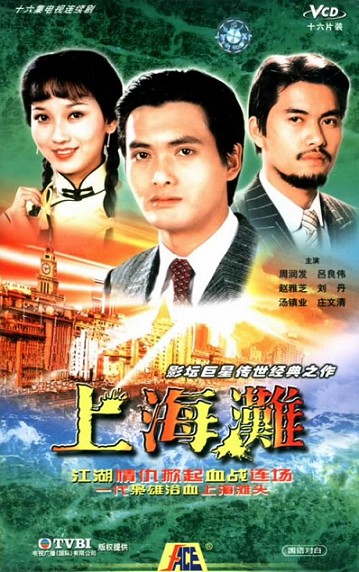
It was then that Fat-Zai , or 'young Fat' as we called him, started asking me questions during our breaks about Hollywood and how an actor can find work there. I had absolutely no idea, I hadn't even been yet, so I answered him as best I could with whatever common knowledge I had. He had a very clear idea in mind though, which was confirmed a little later when he disappeared from the studio for a few weeks, almost a month, and none knew where he was. It's only when he came back that I learned that he actually ran off to ... Hollywood. He tried getting work there, alone. Of course he came back without success, and like he told me 'without connections' you can't do anything over there. So it took him almost 20 years to find that success in Hollywood, and a well deserved success too. I was able to meet Fat-Zai, become Fat-Goh or 'older brother Fat', in sometimes surprising circumstances, which I'll get to later.
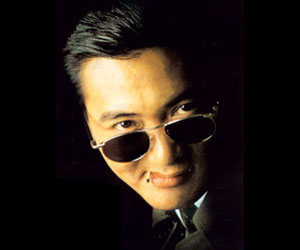 Chow Yun-fat.
Chow Yun-fat.
1982 brought a big change in my professional life: I was recruited as a film dubber. It was 'earphone dubbing', for those who know, and it was full time. Six, sometimes seven days a week, eight to ten hours a day, we sometimes slept in the studios! We all made a good salary at the end of the month. I was able to save up enough cash to do my first round-the-planet trip in 1983-1984: back to Montreal, then Europe, South Asia, and then back to work in Hong Kong. Our dubbing team was working for the big Hong Kong Film Studios of the day: Shaw Brothers, Golden Harvest and... IFD and Godfrey Ho. A little fact that not too many people know: Stuart Onslow-Smith, myself and other more anonymous foreign actors had all worked for Godfrey Ho as dubbers long before we ever had roles in his films. In the 1980s, all Chinese films from Shaw Brothers, Golden Harvest, IFD and others were dubbed in English for the Indonesian market, because Chinese language was then illegal there. And as well as movies, we were also dubbing TV series, it was really mass production dubbing! Stuart Smith.
Stuart Smith.
Godfrey was always present in the dubbing studio, with an amused smile, distant, but always very clear about what he wanted, and he always payed on time. So he had a good reputation. When he started inviting dubbers to act in his films in 1986-1987, none refused. And since we were told that it was for the Indonesian market, far from the eyes of our relatives in North America, Europe and Australia, we all agreed. It was only in 1992 that a friend in Los Angeles told me he bought a VHS with me as a ninja at his corner store! I laughed and he sent me a copy.
 Godfrey Ho.
Godfrey Ho.
In Hong Kong, even today, one rarely signs contracts: you're paid once, and after that the owners can do whatever they want with your work. Unions and syndicates in Hong Kong either don't exist or have no powers. So I just thought Godfrey must had found a way to sell his films in the US, and in Hong Kong that was his right. I must also clarify that I wasn't seriously looking for a career in cinema. I was open to any new experience and if I was invited I'd say yes, but I was not actively looking for work as an actor. Which wasn't the case with other dubbers, those other 'more anonymous foreign actors' in Godfrey's movies who were professional thespians in Hong Kong theatres, or Stuart Onslow-Smith, who afterwards was able to get a few choice roles in reputable movies. For me it was around 2 days of filming for each of Godfrey's films. We were dubbing them, so Godfrey was shooting without sound, in public parks or private homes to cut costs (a real art in Hong Kong).
 Pierre Tremblay and Bruce Baron in Ninja Champion.
Pierre Tremblay and Bruce Baron in Ninja Champion.
I also filmed 2 days with Bruce Baron in an area I never knew before in Kowloon Park, in Tsim Sha Tsui. Of course we only did our own Kung Fu moves in those scenes where you can see our faces, in all others they're Chinese stuntmen. We talked a bit during breaks, fixing the lighting always took the most time. He liked to talk about sex (he liked it "hot and wet"), money (to make sure Godfrey wasn't paying me more than him), and to go over our dialogue. That was it. I heard him speak his Chinese but I have to admit I didn't understand much. I was some distance away when he had his altercation with the Chinese stuntmen. Godfrey had to physically intervene to separate him from the other two. One thing for sure, at that moment Mr. Baron was pronouncing his Chinese swearwords very well. I also had a 2-3 day shoot with Richard Harrison, who was professional, courteous and with whom I spoke very little. He got along very well with Godfrey during these few days of filming, you could even say he was treated with the greatest respect.
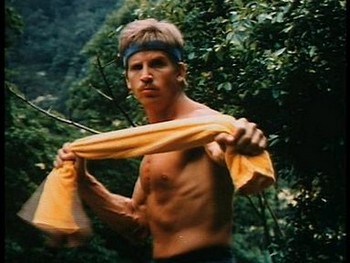 Bruce Baron.
Bruce Baron.
You were asking me about Filmark, I never knew them ; you mentionned Alphonse Beni, Grant Temple, never knew nor met them ; and your scene of me dubbed by Marc Malloy (another member of our dubbing group), was done because I wasn't in Hong Kong at the time and Godfrey asked Marc to dub me. We only rarely saw the big boss Mr. Lai.
That's it for my acting career, which will take a break till my last films in 2001 and 2003, and the TV series a few years before. Richard Harrison and Pierre Tremblay in Ninja Dragon.
Richard Harrison and Pierre Tremblay in Ninja Dragon.
In 1986 I started to work as a radio presenter, and also doing voice-overs for TV commercials. Two activities I'm still doing today. It's also at that time I met 'Fat Goh' again. He had just re-married and that day came in with his new wife to the studio, in the heart of Mongkok, where I was working on a 35mm Steenbeck, putting the finishing touches to the subtitles on his new film (I forget which one, sorry). After all those years he immediately recognized me, said hi and asked how I was. He was already a big star in Hong Kong, but his fame had rather converted him into a saint! He was super nice with everyone, he even massaged the feet of the doorman (!), and then invited us to a new restaurant that just opened not far from the old airport. A real good guy!
In the 80s, I mostly learned the 'audio' side of media with dubbing, radio and voice-overs. But the 90s allowed me to broaden my knowledge and learn more about the 'production' side of television, as a speaker in front of the camera and producer behind, as well as reporting and doing chronicles.
It started in 1991 when I was the host of a show on ATV-World for a 13 episode weekly half-hour series called 'L'Art de Vivre', badly translated in English as 'Good Living the French Way'. It was sponsored by the French Consulate and was meant to highlight the French presence in Hong Kong through it's luxury products and cultural activities. It was the most criticized show by British journalists of the day, and the most watched by the Chinese public. I wasn't only presenting, I was also scripting, finding the guests, and since there was so much French involved, I was also assisting editing and production. That was also the year I started interviewing Beijing Rock stars passing through Hong Kong for local radio, and I was invited to write a chronicle on the Chinese market for a magazine that no longer exists. That allowed me to be invited by MTV-Asia to go to Beijing to interview the stars in 1993, then after 1995 as a regular 'stringer', ie free-lance journalist. That means I told the cameraman the shots I wanted, lighting and everything, I interviewed the musicians from behind the camera (neither my face nor my voice were broadcast); I basically did everything except the editing, which was done in Singapore.
 Pierre and the band OTO (RTHK photo).
Pierre and the band OTO (RTHK photo).
In 1994, I was invited to act in the series 'All In The Family'. It was with RTHK, Radio Television Hong Kong, where I was presenting and producing specialized music shows since 1989. My Cantonese was better, I felt more comfortable in front of the camera, and it was well received by the Cantonese public. So well received that a second series was launched in 1996, of which one episode was shot in Shanghai. This time I made an effort to learn to act better, but the series ended much too early.
In the meantime I was still working as a 'stringer' for MTV-Asia, but only in Hong Kong till 1997; I also worked for some time as a Hong Kong correspondant for a Manila TV; I filmed a mini-documentary on VHS to accompany the publishing of a book; I even wrote an article on China's rock market for Billboard's special China edition of November 1998 ; and at the same time I started presenting and producing current affairs reports on everything, from the economy to politics, security and health in Hong Kong, for radio at RTHK.

It was also at this time I believe, around the year 2000, that I met Chow Yun-Fat in the Hong Kong MTR. It was in the 'Central' station at the D2 exit, which leads to a trendy period Chinese clothes shop called 'Shanghai Tang', a reference to the Shanghai of the 1930s by it's owner David Tang, who put his name in English (Tang instead of Tan), and a reference to the 80s TV series whose main star was Chow Yun-Fat. He was at that time an international star and famous in Hollywood; he was coming down the steps, I was going up them. He immediately recognized me and greeted me, asking me how I was doing! Surprised, I gave him a quick resume of my activities and thanked him for giving me 'so much face'. We parted under the bemused eyes of the crowd. Six months or one year later, still in the same 'Central' station, D2 exit, I met him again. Only this time it was the reverse: I was coming down, he was going up, and he was wearing a baseball cap, pulled down to hide his face. I recognized him immediately but I respected his obvious wish for anonymity. I kept on walking without saying a word.
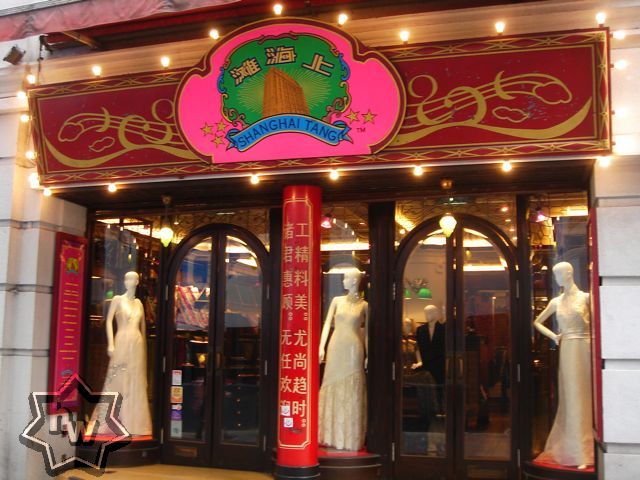 The Shanghai Tang store in Hong Kong.
The Shanghai Tang store in Hong Kong.
While we're at it, I have one last piece of unflattering information I wish to confess. Some time in 2000, TVB released a VCD collection of the first 'Bund' TV series. I was so surprised to discover all my scenes were cut! There were barely a few verbal references by some actors to the French consul 'Mr. Pierre'. Then I remembered my scenes with my beginner's Cantonese, and one scene in particular where my face had the same expression as in the torture scene in Tsui Hark's movie, with my eyes bulging out. I had to admit, I would've done the same. But not you.
Does your website annoy me? At first, yes. Who likes to be laughed at? Then, as time passed by, I got used to it, and I have to admit that my photos are funny. So I'm laughing too.
Also with time I came to believe that to act well, an actor has to really know the emotion he portrays, especially his facial expression. I now knew what I wanted, but could I do it?
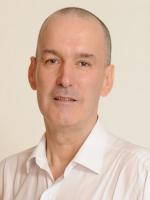
In 2001, I was invited to act in director Lam Wah Chuen's first movie. It was called 'Accidental Fire' (a.k.a. 'Runaway Pistol') and won a few awards at Taiwan's Golden Horse Festival. My performance had nothing to do with that. I had decided to show as little emotion as possible, since that had worked so well in Tsui Hark's 1980 movie, but the results were disappointing. Empty of expression, my face seemed out of place. I went from one extreme to another: from over-acting to not enough.
In 2003, I was invited to act in the very first movie of a young director who showed tremendous talent. The movie was called 'You Shoot, I Shoot', and the director was Pang Ho Cheung.

My role was in one scene only, I was playing the voice of the poster of a young... Alain Delon. Rarely have I had so much fun! My 'poster' was talking in French to the main hero of the film, Eric Kot, who was answering me in Cantonese. Of course I also wrote my dialog, being the only French-speaker in the team, and following the director's indications I almost ended up repeating myself to cover the time frames he wanted. And even though my voice bears no resemblance to Alain Delon's, I was able to Frenchify my Québec accent enough to make it credible to the Hong Kong audience. So I had temporarily found a middle ground: I acted with my voice and not with my face.
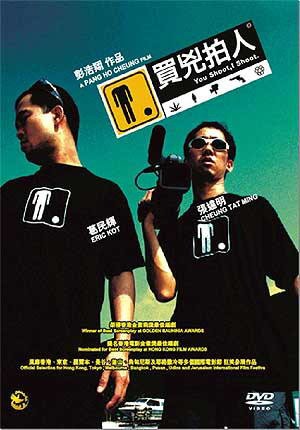
My 2003 interview with Radio-Canada that you found got me some work, giving summer chronicles for a few years at the '1ère Chaîne', then I worked as a stringer with MTV-Asia again for a few more years; and my work at the radio and as a voice-over artist in English, French and Cantonese continues. I still hope that one day I'll be able to act well, before I reach 70? Please don't wait.

I will answer your last two questions as one: my advices, and looking back on my career so far.
To all of you wanting to become an actor/ress, don't do like I did! Take classes, learn the craft first.
To all of you who feel a talent for something as yet undefined: only experience, patience and dedication can bring it out. Good luck.
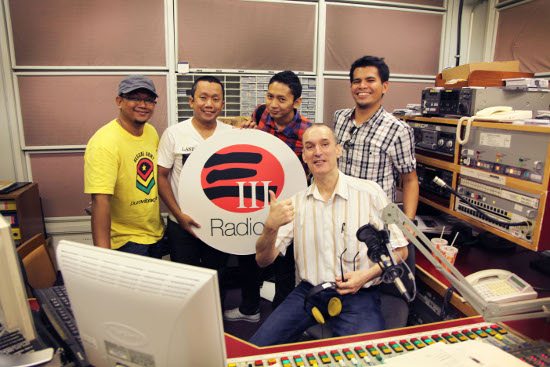 Pierre with the Pesawat Malaysian band (RTHK photo).
Pierre with the Pesawat Malaysian band (RTHK photo).

